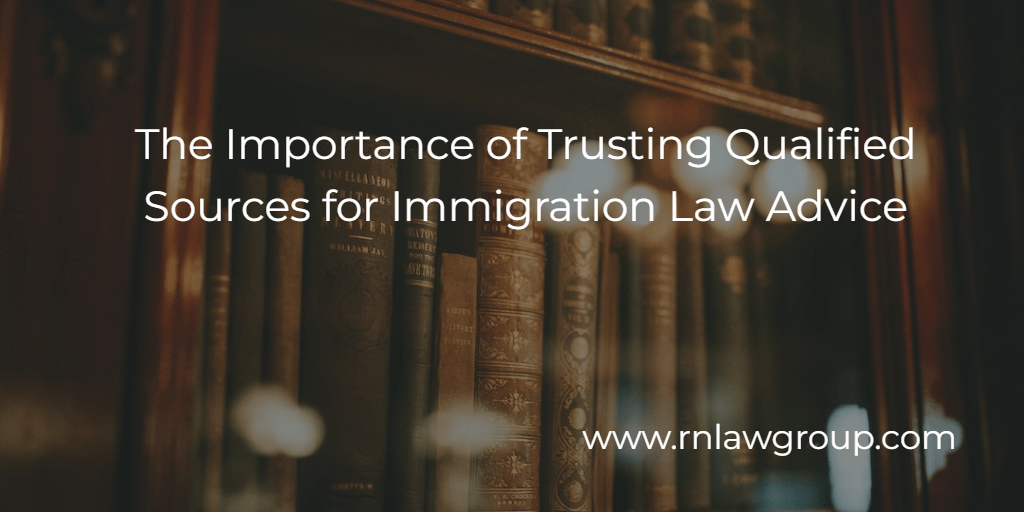
The Importance of Trusting Qualified Sources for Immigration Law Advice
I recently shepherded a nervous client through the EB-2 National Interest Waiver process and along with answering his questions and managing expectations, I found myself responding to issues raised by a new entity, YouTube. My client had been spending time on YouTube and had gone down a rabbit hole of EB-2 NIW videos and had been scared by videos from a specific person, who shall not be named, advising people to not mention a specific topic because it would guarantee a Request for Evidence. The specific topic in question, labor shortages in the Petitioner’s field, was something which I had been discussing in EB-2 NIW petitions for more than three years, since I started working on NIW petitions, so I was, naturally, quite puzzled. I spent a Wednesday night watching this YouTuber’s videos on the topic, so that I could calm the concerns of my client. This YouTuber, who is not an immigration lawyer, made a sensible, clear, and cogent argument in favor of his position, which was unfortunately quite incorrect.
To briefly summarize, the YouTuber claimed that you should not mention labor shortages because the labor certification process exists to handle those labor shortages. While this initial claim is true, the YouTuber failed to mention that the labor certification process is extremely time consuming and has many drawbacks which can slow the process of bringing critically needed skilled workers to the US and that is an a criteria in the process. The YouTuber also claimed that labor shortages alone are not sufficient to prove that a specific field has national importance, which is of course true. However, evidence of a labor shortage alone is almost never used to prove that a field is of national importance. Instead it is used in combination with recognition of said labor shortage by the U.S. government and evidence of actions which they have taken to address the shortage.
The YouTuber’s video was very informative but his insistence on holding to a hard line, in addition to blurring the lines between different criteria, had led him down the wrong path, which my client unknowingly followed.
In the current complex world of immigration law, it is essential for people to seek counsel and direction in order to manage the many steps and requirements. But it’s also important to exercise caution when it comes to the sources from which one gets advice and information. Immigration law is a specialist area that calls for knowledge that is current and skillful. For specific immigration law case counsel, depending on unreliable sources might result in inaccurate information, possible legal issues, and unfavorable outcomes for those applying for immigration benefits.
The intricacy of immigration legislation
The United States has a complex system of laws, rules, policies, and court decisions that make up its immigration law. It covers many types of visas, residency paths, naturalization, and the constantly changing regulatory environment.
Due to this intricacy, people frequently turn to families, businesses, and even individuals for direction and advice on how to handle these complicated procedures. But not every source that gives guidance on immigration issues has the required training or experience.
Unqualified Sources: The Dangers They Pose
Unqualified sources can include anyone, from unaccredited individuals professing to be experts to dubious internet sources, self-described immigration advisors, or even well-meaning friends or relatives. Relying on unprofessional sources for immigration guidance carries a major risk and can result in a number of issues.
- Inaccurate or Outdated Information: Information from unreliable sources may be dated, erroneous, or founded more on hearsay than on legal knowledge. Immigration laws are always changing, so depending on out-of-date information can lead to expensive mistakes.
- Inaccurate Guidance on Eligibility and Procedures: Immigration matters can entail a number of variables, such as the unique circumstances of each individual, eligibility requirements, and the appropriate procedural processes. Individuals may be misled by unqualified sources who fail to take these subtleties into account.
- Legal Repercussions: Following incorrect advice may have legal repercussions, such as deportation, refusal of a visa, or prohibitions on reentering the country. Such consequences may have a significant effect on a person’s family, career, and life.
The Value of Reputable Sources
Seeking guidance on immigration law from knowledgeable sources is essential to ensuring a smooth and compliant procedure. Suitable sources could be:
- Attorneys with licenses specializing in Immigration Law: Immigration lawyers have the training, experience, and legal knowledge required to offer precise and customized counsel. They are knowledgeable about the ever-evolving immigration regulations and are able to provide advice tailored to each individual’s situation.
- Accredited Organizations and Nonprofits: A number of trustworthy organizations and nonprofits provide aid with immigration-related issues. These organizations frequently have qualified representatives who are able to offer trustworthy advice.
- Governmental Sources: Up-to-date and reliable information about immigration law is available from official government websites and agencies including the Department of State and U.S. Citizenship and Immigration Services (USCIS).
The Best Ways to Get Immigration Counsel
When obtaining counsel, people should follow these recommended methods to minimize risks and successfully navigate the complicated world of immigration law:
- Check the Credentials of the Source: Make sure the source is reliable and competent before relying on them for immigration assistance. For lawyers, this entails verifying their immigration law licensure and area of expertise.
- Information Cross-Checking: Examine data from several trustworthy sources. The veracity of the advice received can be supported by data from reputable legal resources and official government websites.
- Exercise Caution with Guarantees: Steer clear of sources that provide assurances of success. Because immigration issues are frequently complex and discretionary, it is impractical to make promises.
- Request Tailored Guidance: Every immigration situation is distinct. Ask for help that is customized to your unique situation as opposed to depending on general or one-size-fits-all advice.
In summary
The ramifications of taking legal counsel from unprofessional sources can be dire when it comes to immigration law. When choosing sources for advice, those seeking immigration benefits should proceed with caution and prudence due to the possibility of disinformation and legal ramifications. Reputable and qualified sources, including government agencies, recognized organizations, and licensed immigration lawyers, can offer the precise and customized guidance required to successfully negotiate the complexity of immigration law.
Through a comprehension of the hazards linked to unreliable sources and adherence to recommended procedures for obtaining immigration counsel, people can equip themselves with the information and direction required to achieve their immigration objectives while reducing the probability of complications or legal problems. In the end, the success and legality of a person’s immigration journey can be greatly impacted by well-informed judgments made under the advice of reliable authorities.
Karim Jivani is a Staff Attorney at Reddy Neumann Brown PC who focuses on employment-based non-immigrant visas. Karim’s practice covers all phases of the EB-1A and EB-2 NIW visa process including filing petitions, responding to Requests for Evidence (RFE), and drafting motions and appeals.
Karim earned his Bachelor of Business Administration degree from Houston Baptist University and his J.D. from University of Houston Law Center in May 2019. During his time in law school, Karim served as an Articles Editor for the Houston Business and Tax Law Journal, a student managed publication dedicated to scholarly research and the academic advancement of business, tax, and corporate law. He was part of the Civil Practice Clinic and Immigration Clinic, where he gained his passion for immigration law. As a child of immigrants, he hopes to continue to play a role in helping individuals start their life in the United States as well as help them navigate the complex and difficult immigration process. He is fluent in English, Urdu, and Hindi.
By: Karim Jivani
Karim Jivani is a Special Attention Staff Attorney at Reddy Neumann Brown PC who focuses on employment-based non-immigrant visas. Karim’s practice covers all phases of the visa process including filing petitions, responding to Requests for Evidence (RFE), and drafting motions and appeals. He has completed over 30 RFE’s to date in response to H-1B, L-1, I-140, and VAWA petitions.

